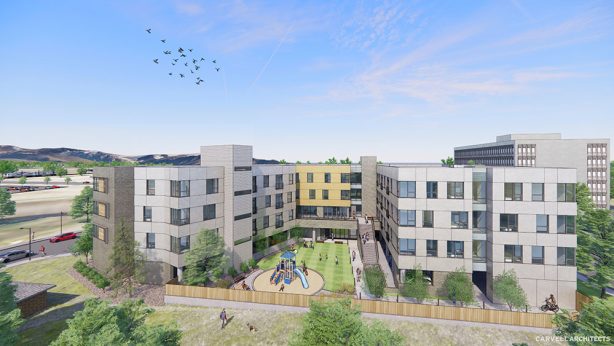February Partner Spotlight of the Month: Morgan & Associates!
Urban Land Conservancy (ULC) celebrates the achievements of our partnerships that create and preserve nonprofit facilities and affordable housing for communities in metro Denver. ULC’s Monthly Partner Spotlight is awarded to partners who demonstrate the value of collaboration, furthering our mission to improve the lives of Metro Denver residents through our real estate investments and community assets.
Congratulations to our March 2019 Partner Spotlight of the Month: Morgan & Associates!
As Metro Denver races to keep pace with more than half a million new residents in less than 10 years, construction sites have dominated the landscape. Many neighborhoods are nearly unrecognizable from years past, as apartment complexes are built in what seems like record time. According to an article by Channel 7 News, Denver was on track to build more than 15,000 apartment units in 2018 alone – compare this with the fact that less than 500 apartment units were built in 2010.
This influx in development, which primarily caters to higher earning households, has left many moderate income residents in need of affordable housing. According to the 2018 Shift Research Lab Report, “Exploring Colorado’s Housing Affordability Challenges in All of Their Complexity,” 50% of households in Colorado are cost burdened, meaning they spend more than 30% of their income on housing. The traditional rule of thumb is to spend less than 1/3 of your annual income on housing costs.
With high end housing on the rise, the demand for affordable housing in the Metro Region is unprecedented. While Metro Denver is struggling to keep up with the need, it is not for a lack of effort. The City of Denver for example voted in August of 2018 to more than double the City’s affordable housing fund, which now has $400 million to spend over the next 10 years on affordable housing. ULC’s Partner Spotlight, Morgan and Associates, is another great example of the many players who work behind the scenes to piece together the complicated puzzle that is affordable housing financing.
As a nonprofit real estate organization focused on the creation and preservation of affordable housing and nonprofit facility space in the Denver region, we often encounter the question, “Why is the there a limited supply of affordable housing?” or, “What is the challenge in developing more affordable housing to meet the current need?” The simple answer is that structuring the financing for affordable housing is complicated, challenging and oftentimes financially cumbersome.
While the financing varies for affordable housing development, it typically includes some combination of equity sources to creating the necessary capital for construction. These sources are some of the moving parts and pieces of how affordable rental housing is developed and include 9% Low Income Housing Tax Credits (LIHTC), 4% LIHTC and State Affordable Housing Tax Credits.
Applying for and receiving tax credits is a complex process that can be expensive and require much patience. For example, ULC’s property at 38th and Walnut – which ULC acquired in 2011 – will soon be home to the Walnut Street Lofts, with construction expecting to begin in the next month. After years of planning and three applications for tax credits, our development partner, Medici Consultant Group (MCG) was finally awarded 9% tax credits. This is where Morgan and Associates plays a critical role, as one of the few consultant groups in the region focused primarily on low income housing tax credit applications.
Dan Morgan, the Founder and President of Morgan and Associates, has worked in Denver’s affordable housing industry since 1979 – seven years before the tax credits we know today even existed. Morgan remembers the national committee that came together to find a more viable solution to finance affordable housing development, which led to the creation of modern-day tax credits.
“In the early 1980’s, a national committee was tasked with finding a more productive and efficient means to finance affordable housing development,” Morgan explained. “The model at the time allowed for high depreciation, but offered little to no incentives to investors that would specifically encourage investment in affordable housing. Without the tax credit that this committee helped bring into being it is safe to say the affordable housing stock in Denver would be substantially less than it is today.
Sam Gary, the founder of Piton Foundation and Urban Land Conservancy, was an original committee member responsible for LIHTC creation. Morgan first met Gary in the early 1980’s while working as a management and financial consultant with Brothers Redevelopment. It was during his time with Brothers that Morgan realized his passion for organizing and obtaining financing for affordable housing deals. In 1985, Morgan set out on his own to work with developers arranging the financing for affordable housing.
During his first two years in business, Morgan explained that there wasn’t much development as investors knew tax credit laws were about to change – for the better. The new Federal Low Income Housing Tax Credit program passed in 1986, and the first projects (in Colorado) were constructed and opened in 1987. Morgan worked with Hope Communities to finance one of the very first projects, the Martin Luther King Apartments – an 18 unit project that had $24,838 in annual credit.
In the early years of tax credits, Morgan explained they were not nearly as competitive as they are today, with many developments cycling through multiple years of tax credit rounds before receiving funds. In an effort to increase nonprofit usage of tax credits, Mercy Housing hosted workshops that were led by Morgan, Ken Hoagland and Paul Smith to help nonprofits better understand the new financing tool. For many reasons, affordable housing practitioners (like ULC) and residents alike have Morgan to thank for his role in this pivotal form of financing.
For more than 30 years Morgan has worked with sponsors to put together the complicated financing needed to make affordable housing feasible. A key ingredient of this financing has been the low income housing tax credit. Morgan said that while the work has been intellectually challenging, it is very rewarding to see the outcome – safe decent housing for people that might not otherwise have it. Morgan also feels very fortunate to work with so many talented and committed people who share a common goal.
“Low income housing tax credits are vital to nearly every affordable rental housing development that ULC has been a part of,” said Aaron Miripol, President & CEO of Urban Land Conservancy. “I know Dan Morgan to be modest, but he has truly played a revolutionary role in the affordable rental housing industry through his tax credit expertise.”
Since 1987, Morgan has worked on too many tax credit applications to count. In fact, he stopped keeping track after his company surpassed 100 tax credit applications a few years back. While it is hard for Morgan to single out a specific development, he stepped out of his traditional consulting role during an affordable housing development in the Highlands. The Juan Diego Apartments were developed specifically for individuals living with HIV/AIDS. At the time, several Highlands neighborhood residents put forth a strong opposition to the City funding the project. Morgan appeared before Denver City Council in support of the development. Mayor Hancock (who was a councilman at the time) gave an emotional endorsement of the project. In the end, Denver City Council voted unanimously to approve the funding. The project has proven successful at both providing affordable housing and at being a good neighbor.
Morgan also discussed modern-day challenges with tax credits, primarily due to their competitive nature. Despite the 70,000 unit shortfall in Metro Denver, only 6 affordable housing developments in the 7 county metro area were awarded 9% low income housing tax credits in 2018. While this will support the creation or preservation of 533 units, an unsurmountable gap remains. While proponents strongly advocate for increasing the tax credit pool, it only increased by four percent in 2018. Morgan feels confident that tax credits are not likely to decrease however, as they have strong bipartisan support.
Nearly 35 years later, and Morgan and Associates have added a new partner to the team. Dan’s son Adam joined the company 15 years ago and works primarily out of Phoenix, Arizona. Together, the two submit 4-5 projects annually and show no signs of slowing down. On behalf of Urban Land Conservancy and the thousands of affordable housing residents in Colorado, we are very grateful for Morgan and Associates. Thanks to their knowledge and expertise, tax credits are a fully utilized resource across the U.S. We have been fortunate enough to partner with Morgan and Associates on several developments and look forward to our continued partnership working together in the future!



